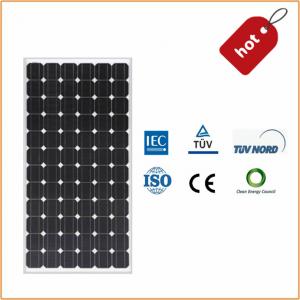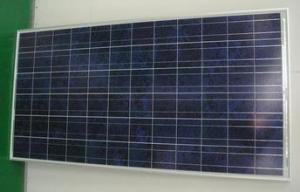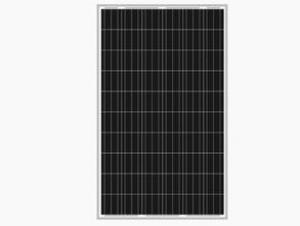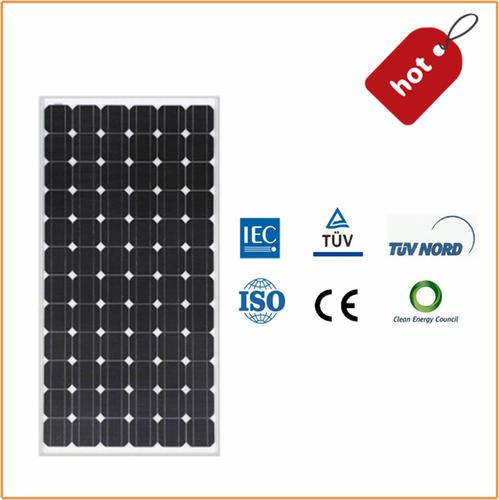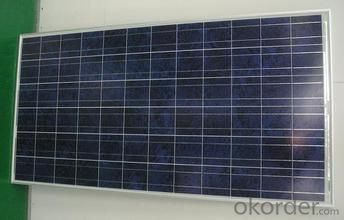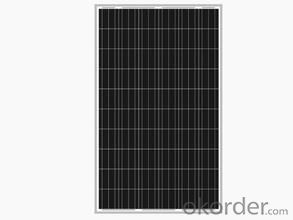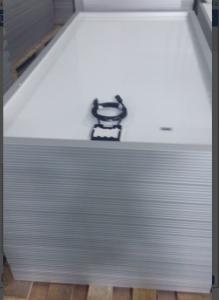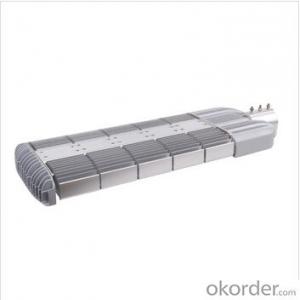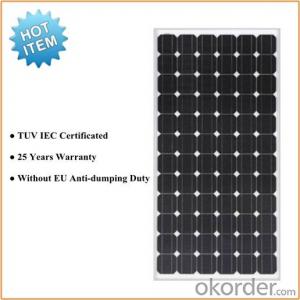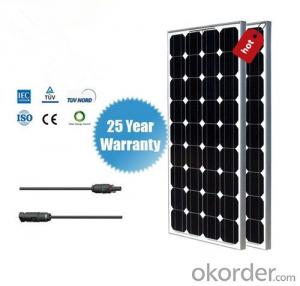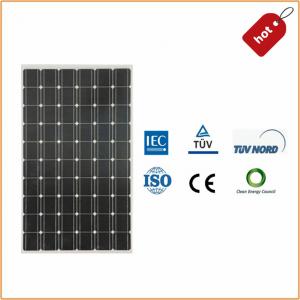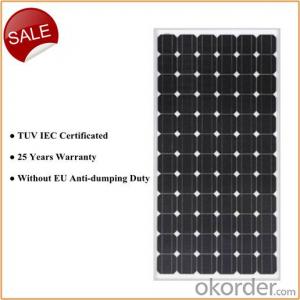Jinko Solar Panels Mono PV Solar Panel 280W with Solar Panel Certification TUV
- Loading Port:
- Ningbo
- Payment Terms:
- TT or LC
- Min Order Qty:
- -
- Supply Capability:
- 600MW Annual Year watt/month
OKorder Service Pledge
OKorder Financial Service
You Might Also Like
Prices for pv Solar Panels (280W Solar Module) with 280W Solar Panel Certification TUV
Mono 280w Panel Certificated with TUV,IEC,CEC,CE and so on.
Solar Panel Mechanical Characteristics
Cell Type | Mono Crystalline 156×156mm(6 inch) |
No. of Cells | 72(6×12) |
Dimension | 1956×992×50mm |
Weight | 23kg |
Solar Panel Component Element
Front Glass | 3.2mm, High Transmission, Low Iron, Tempered Glass |
Frame | Anodized Aluminum Alloy Type 6063-T5 |
Junction Box | IP 65 Rated (Black) |
Output Cables | TUV 1×4mm2, length:900mm |
Connector | MC4(UV resistance and self-locking/IP67) |
Encapsulation Material | EVA(0.50±0.03mm thickness) |
Back Foil | White TPT(0.32±0.03mm thickness) |
Fixing Adhesive | Silicone Sealant(White) |
Solar Panel Specifications
Module Type | 280M | ||||
Maximum Power at STC (Pmax) | 280Wp | ||||
Maximum Power Voltage (Vmp) | 36.20V | ||||
Maximum Power Current (Imp) | 7.74A | ||||
Open-circuit Voltage (Voc) | 43.4V | ||||
Short-circuit Current (Isc) | 8.27A | ||||
Module Efficiency (%) | 14.4% | ||||
Operating Temperature( °C ) | -40°C ~+90°C | ||||
Maximum System Voltage(V) | DC 1000V(TUV) / DC600V(UL) | ||||
Maximum Rated Current Series(A) | 15A | ||||
Power Tolerance | 0~+3% | ||||
Temperature Coefficients of Pmax | (-0.45±0.05)%/°C | ||||
Temperature Coefficients of Voc | (0.05±0.01) %/°C | ||||
Temperature Coefficients of Isc | (-0.35±0.02)%/°C | ||||
NOTC(°C ) | (47±2)°C | ||||
STC: Irradiance 1000W/M2 Module Temperature: 25°C AM=1.5
Solar Panel Warranty
Warranty | 10-year warranty on product material and processing technology |
Industry power output warranty: 90% in 12 years, 80% in 25 years |
Solar Panel Packing Configuration
Q’ty/Pallet, | 1×20’ft | 1×40’GP | 1×40’HQ |
Pallet Q’ty | 10pallets | 24pallets | 24pallets |
Q’ty/Container | 200pcs | 480pcs | 528pcs |
How the Solar Panel Works
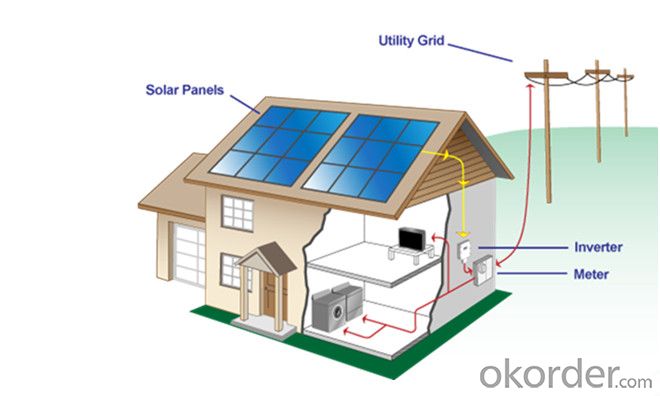
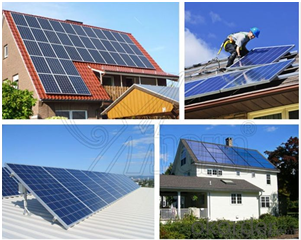
FAQ
I..Will you focus on the safety of the goods during transportation?
Yes, Safety of the cargo is the primary element that we would consider on transportation.
II..How would guarantee the quality will meet the requirements of your clients?
Before shipment, we will have inspection for each batch of goods.
III..What certificates do you have?
IEC,UL,TUV,CSA,etc.
IV..Can you do OEM according to clients’ requirements?
Yes, we have our own brand while we can provide OEM service
- Q: Can solar panels be used in urban areas with limited space?
- Yes, solar panels can be used in urban areas with limited space. There are various options available such as rooftop installations, vertical panels, and solar canopies. These solutions maximize the use of limited space and allow urban areas to harness solar energy efficiently.
- Q: Can solar panels be installed on government buildings?
- Yes, solar panels can be installed on government buildings. In fact, many governments around the world are actively promoting the adoption of renewable energy sources, including solar power, in their buildings to reduce carbon emissions and promote sustainability. Installing solar panels on government buildings not only helps in reducing energy costs but also sets an example for the public and encourages wider adoption of renewable energy.
- Q: Can solar panels be used in countries with limited sunlight?
- Yes, solar panels can still be used in countries with limited sunlight. While solar panels are most effective in areas with abundant sunlight, they can still generate electricity in countries with limited sunlight. Although the energy output might be lower compared to sunnier regions, advancements in solar technology, such as increased efficiency and better storage solutions, allow solar panels to be a viable renewable energy option in countries with limited sunlight.
- Q: Can solar panels be installed on disaster relief shelters?
- Yes, solar panels can be installed on disaster relief shelters. Solar panels provide a sustainable source of energy and can help power essential equipment and devices in these shelters, such as lights, communication systems, and medical equipment. This reduces the dependency on traditional energy sources and ensures uninterrupted power supply in critical situations. Additionally, solar panels are lightweight and portable, making them suitable for temporary shelters and easy to transport to affected areas.
- Q: Can solar panels be used in areas with high levels of lightning activity?
- Yes, solar panels can be used in areas with high levels of lightning activity. However, it is important to install proper lightning protection systems and grounding measures to minimize the risk of damage or electrical surges caused by lightning strikes.
- Q: Can I add reflectors or mirrors around the solar panels to increase the power they generate?
- In the 70's when silicon was really expensive, they played with using fresnel lenses to focus the sunlight on small solar cells but these panels had to be on heliostats and aimed directly at the Sun. These days, with nano-technology, there's a renewed interest in the concept but the fundamental weakness is that there are diminishing returns, at some point, it's just less expensive to have more solar cells.
- Q: Can solar panels be installed on oil or gas facilities?
- Yes, solar panels can be installed on oil or gas facilities. This is known as hybrid energy systems, where solar panels are integrated with traditional fossil fuel facilities to generate electricity. This combination allows for the diversification of energy sources, reducing reliance on traditional fuels and minimizing carbon emissions. Additionally, solar panels can help offset the energy consumption of oil or gas facilities, making them more sustainable and environmentally friendly.
- Q: Is there a small solar panel system that I can put in my bedroom window and charge my phone and run an alarm clock off of? Or one I can run a microwave off of?
- tell me at roughly $500 each, just how many panels would you like to buy? ;-)
- Q: OK so how do these solar panels supplement the AC from the grid? Like do they invert the output of the solar panels and sync two AC sources together? If so how and with what? Or do they convert the AC from the grid to DC and then supplement and then invert it? If so how and with what? Thanks
- you have had 2 good solutions already yet once you go with greater advantageous examining on photograph voltaic panels and technical suggestions on the factor components of a photo voltaic panel setting up take a seem on the link under which has over one hundred quite good articles on photograph voltaic.
Send your message to us
Jinko Solar Panels Mono PV Solar Panel 280W with Solar Panel Certification TUV
- Loading Port:
- Ningbo
- Payment Terms:
- TT or LC
- Min Order Qty:
- -
- Supply Capability:
- 600MW Annual Year watt/month
OKorder Service Pledge
OKorder Financial Service
Similar products
Hot products
Hot Searches
Related keywords
